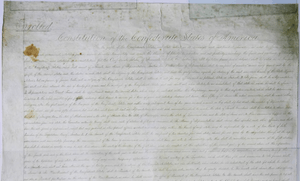Duncan F. Kenner
Duncan F. Kenner (born Duncan Farrar Kenner; February 11, 1813 – July 3, 1887) was an American politician who served as a Deputy from Louisiana to the Provisional Congress of the Confederate States from 1861 to 1862. In 1864, he served as the chief diplomat from the Confederate States of America to Europe.
Duncan F. Kenner | |
|---|---|
 | |
| Deputy from Louisiana to the Provisional Congress of the Confederate States | |
| In office February 4, 1861 – February 17, 1862 | |
| Preceded by | New constituency |
| Succeeded by | Constituency abolished |
| Personal details | |
| Born | Duncan Farrar Kenner February 11, 1813 New Orleans, Louisiana, U.S. |
| Died | July 3, 1887 (aged 74) New Orleans, Louisiana, U.S. |
| Resting place | Ascension Catholic Cemetery, Donaldsonville, Louisiana, U.S. |
| Spouse(s) | Anne Guillelmine Nanine Bringier |
Biography
Douglas Farrar Kenner was born on February 11, 1813, in New Orleans. His ancestors were from Virginia.[1] Kenner was married to the former Anne Guillelmine Nanine Bringier (August 24, 1822 – November 6, 1911). They resided at the Ashland Plantation. Kenner was the owner of sugar plantations in Louisiana. He used scientific techniques and was said to be the first man in Louisiana to use a railroad to bring sugar cane from the fields to the mill. He served as the President of the Louisiana Sugar Planters Association.[1] He started his political career by working for John Slidell.[1] He served for several terms in the Louisiana House of Representatives and was a member of the state constitutional conventions of 1845 and 1852, having presided over the latter conclave.
During the American Civil War of 1861-1865, he was a member of the Confederate Congress and chairman of its Ways and Means Committee.[1] In 1862, he proposed a national income tax of 20%, including a schedule of exemptions. His tax bill went nowhere; but in April 1863, the Confederate Congress passed another act calling for a tax "in kind," payable with goods and agricultural produce rather than money, and based not on property but on agricultural produce and income it generated. In July 1862, while visiting with his family at Ashland Plantation during a recess of the legislature, Kenner narrowly avoided capture by the Union Army, making his escape after being warned by one of his slaves of the advance of Union troops. By this time he had become convinced that the emancipation of slaves was the only way to gain independence for the Confederacy. In 1864, he was sent by Jefferson Davis as special commissioner to England and France to secure the recognition of the Confederate States.[1] Davis, through Kenner, offered the emancipation of the Confederate slaves in exchange for diplomatic recognition of the Confederacy by Britain and France.[2] Following the capture of New Orleans in 1862, much of his property was confiscated and his slaves were freed.
After the war, he regained his wealth. Kenner was fond of horses and owned one of the largest stock farms in the United States. In 1877 Kenner created the Louisiana Sugar Producer's Association, representing the largest planters in the state. He served as the president of the World Cotton Centennial. He also served on the Boards of Directors of several banks.[1] Ten years later, a few months after his death, the Thibodaux Massacre was carried out by Democratic paramilitaries and concerned citizens in response to 10,000 sugar cane workers, 90% black, striking for three weeks, having been reverted almost to unpaid slave status. Kenner died on July 3, 1887.[1] He was buried in a tomb in the Ascension of our Lord Catholic Church Cemetery in Donaldsonville, Ascension Parish, Louisiana.
References
- "An Old Confederate Dead.: The Political Career of Duncan F. Kenner" (PDF). The New York Times. July 4, 1887.
- Donald, David Herbert (1995). "Chapter Twenty: With Charity for All". Lincoln. Simon & Schuster. p. 547. ISBN 0-684-80846-3. OCLC 35914369.
External links
- Duncan F. Kenner at Find a Grave
- Duncan F. Kenner at The Political Graveyard
- Duncan Farrar Kenner Papers at Louisiana State University
| Political offices | ||
|---|---|---|
| Preceded by New constituency |
Deputy from Louisiana to the Provisional Congress of the Confederate States 1861–1862 |
Succeeded by Constituency abolished |
